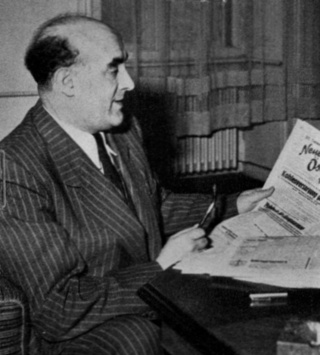Dr. Rudolf Heinrich Kalmar jun.

Personalia
Born:
Died:
Profession:
Persecution:
Imprisonment 17.03.1938 - 02.04.1938,
Dachau concentration camp 02.04.1938 - 27.09.1939,
Flossenbürg concentration camp 27.09.1939 - 02.03.1940,
Dachau concentration camp 02.03.1940 - 10.11.1944,
Penal company 10.11.1944
KZ Number:
Curriculum Vitae
Rudolf Heinrich Kalmar Jr. was born in Vienna's 8th district, the son of Rudolf Kalmar, a civil servant at the Vienna Executive Court, and his wife Charlotte, née Hörmann. His father later became a journalist at the Deutsche Zeitung, from 1916 at the Deutsches Volksblatt and from 1922 at the Österreichische Sonntags-Zeitung. From 1925, he was editor-in-chief of the Wiener Neueste Nachrichten.
Rudolf Kalmar jun. attended Seitenstetten Abbey Grammar School after elementary school. Immediately after graduating from high school, he began working as a journalist for the Deutsches Volksblatt. At the same time, he enrolled in law and political science at the University of Vienna. From 1922, he worked as a journalist for the newspaper Der Wiener Tag. In 1927, he obtained a doctorate in law and political science.
From 1934, he was the non-political editor-in-chief of this newspaper and the Monday paper Der Morgen, which, together with the affiliated Zehngroschenblatt am Montag, advocated an Austrian course and strongly rejected National Socialism, with Vincenz Ludwig Ostry as political editor-in-chief. Among other things, Rudolf Kalmar jun. wrote the weekly column Sozialpolitik des Tages and was particularly committed to the rights of the "small man".
As a staunch opponent of National Socialism, Rudolf Kolmar jun. experienced the downfall of a free and independent Austria with the invasion of the German Wehrmacht on March 12, 1938. On March 17, 1938, he was arrested by the Gestapo and deported to the Dachau concentration camp on April 2, 1938 on the so-called Prominent Transport. As the Dachau concentration camp was cleared for the SS at short notice following the Third Reich's invasion of Poland and the associated outbreak of the Second World War, he was deported to the Flossenbürg concentration camp on September 27, 1939 and from there he was transferred back to Dachau concentration camp on March 2, 1940.
On June 13, 1943, one of the most bizarre open-air theatre performances of the 20th century took place on the small roll call square at Dachau concentration camp. A group of Austrian, German and Czech concentration camp inmates perform The Night of Blood on the Schreckenstein in front of other prisoners and the SS guards. The play in the style of the Pradler Ritterspiele, in which many heads traditionally roll, was a Hitler satire written by Rudolf Kalmar Jr. The star and director of the six performances was Erwin Geschonneck.
On November 10, 1944, Rudolf Kalmar Jr. from Dachau concentration camp was assigned to a Wehrmacht punishment company on the Eastern Front. During one of its first missions, it was taken by surprise by the Red Army and captured.
Returning from Soviet captivity on September 4, 1945, he worked briefly in the arts section of the Ministry of Education (Federal Theater Administration), but in the same year joined the editorial team of the newspaper Neues Österreich, where he was local editor and editor-in-chief from 1947 to 1956. He also wrote manuscripts for radio and television series as an employee of the Austrian Broadcasting Corporation. From 1957 to 1960, Rudolf Kalmar Jr. worked for the daily newspaper Die Presse. From 1960, he was head of the Literary Office of the Federal Theatre Administration.
In recognition of his services to journalism and the cultural life of Vienna, Rudolf Kalmar Jr. was elected President of the Austrian Press Club Concordia in 1958, of which he had already been Vice President in the years before 1938. Under his presidency, he turned the Press Club into a forum where the most interesting press conferences and the most important presentations by foreign personalities took place. With the first Concordia Ball after the Second World War in 1960, which he initiated, he also put the Press Club at the center of society. He was also a member of the Austrian P.E.N. Club.
Places
Residence:
Persecution:
Citations
Dokumentationsarchiv des österreichischen Widerstands (DÖW)
Wikipedia unter de.wikipedia.org/wiki/Rudolf_Kalmar_junior
Matricula Online
